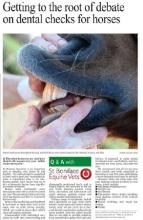The other horses on my yard have their teeth rasped every year – is this really necessary?
Routine dentistry is an important part in keeping your horse fit and healthy – his teeth should be examined at least once a year and vaccination is often a convenient time to do this. Recent studies have shown that up to 80% of domestic horses have significant dental problems.
Horses teeth continually grow throughout their life at a rate of 2-3mm per year. This growth is balanced by the chewing of grass and fibre to wear teeth down evenly. Horses that are fed hay and hard feed do not need to chew their food in the same way as wild horses grazing, which can result in sharp edges which cause ulceration and pain.
Compounded with individual variations in tooth size, overcrowding and abnormally positioned teeth, and in ridden horses, the pressure of the bit and bridle pressing against sharp teeth, ulceration and lacerations can easily develop, making eating and riding painful and unpleasant.
Using a range of equipment, including a speculum (or gag), head torch, mirror, hand rasps and power instruments, your vet can carry out a thorough dental examination and any treatment needed, with the added benefit that we are able to provide sedation, local anaesthetics, pain relief and antibiotics, if required, to make dental treatment more comfortable and less stressful for your horse, and safer for you.
We recommend that all horses have their mouth and teeth examined at least once a year. For some individuals, a more frequent check may be advised. However, there are some signs that may indicate a dental problem in your horse, which include:-
- Quidding (dropping food)
- Weight loss
- Bad breath
- Discomfort when ridden including head shaking, evasion of the contact, head tilts
- Facial swellings and nasal discharge
- Choke
If you would like more information on Routine Dental Care for your horse, please call for a factsheet - 01363 772860, alternatively, speak to one of our equine vets.


